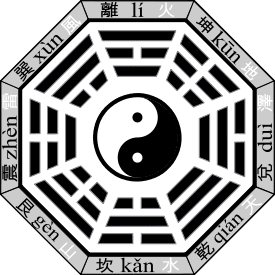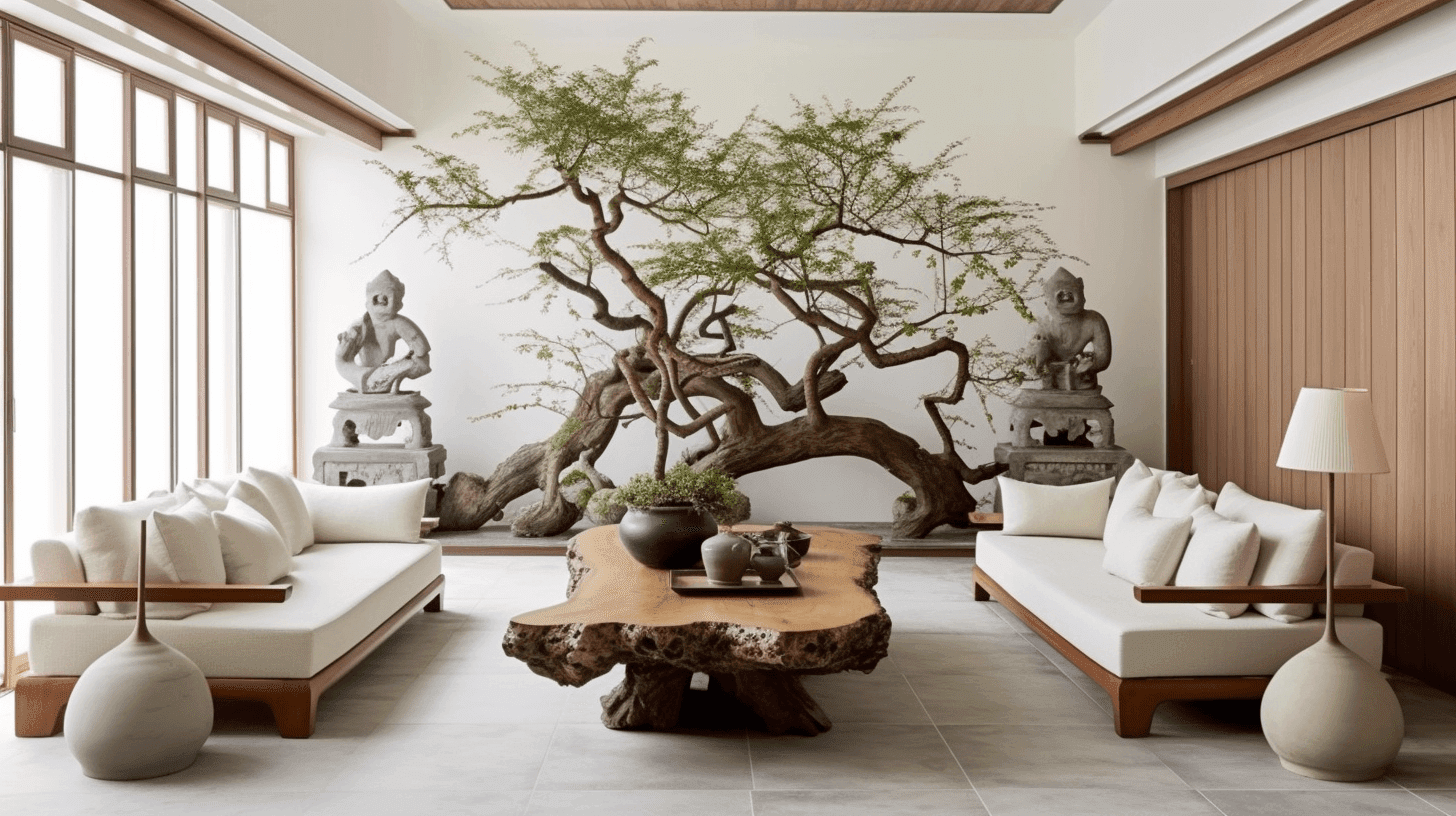Feng Shui is an ancient practice with roots in traditional Chinese culture that seeks to harmonize individuals with their environment. The term ‘Feng Shui’ comes from the Chinese words for “wind” and “water,” representing the idea of balance, movement, and energy flow.
At its core, Feng Shui is a philosophy that aims to enhance the quality of life by balancing energies present in an individual’s surroundings.
Practitioners believe that everything in our environment holds energy or qi (pronounced “chee”) and seek to analyze how this energy moves through a space. They then make adjustments or rearrangements to help improve the flow of positive energy while reducing negative energy.
Brief history and origins of Feng Shui
While its origins date back more than 5,000 years ago, it wasn’t until the Han dynasty (206 B.C.-220 A.D.) when it became known as ‘Feng Shui.’ At first, only emperors and high-ranking officials were allowed access to these practices. But over time, it trickled down into society and became accessible to everyone.
In China’s early days, Feng Shui was considered a form of divination – predicting one’s future based on environmental factors such as topography or weather patterns instead of using tarot cards or crystal balls like Western divination practices. It evolved into a way for people to take control over their lives by creating harmony between themselves and their surroundings.
Today we see many variations of Feng Shui around the world as different cultures have integrated their beliefs into its principles. And while some may view it skeptically as superstition rather than science, there can be no denying the sense of tranquility found in well-balanced spaces created through the principles of Feng Shui.
The Basics of Feng Shui
Feng Shui is a complex and ancient Chinese practice that focuses on creating harmony between individuals and their environment. At its core, Feng Shui revolves around balancing the energies present in our surroundings to achieve balance and harmony. To begin understanding this practice, it is essential to understand some of its fundamental principles.
The Five Elements: Water, Wood, Fire, Earth and Metal
One of the core components of Feng Shui lies in understanding the five elements – water, wood, fire, earth and metal. According to Feng Shui principles, everything can be classified into these five different elements. Each element is associated with specific colors, shapes, materials and emotions.
For example:
- Water represents wisdom and intelligence
- Wood symbolizes growth and change
- Fire is associated with passion and energy
- Metal represents clarity and precision
- Earth signifies stability and grounding.
Yin and Yang Principles
In addition to the five elements theory, Yin-Yang principles are also fundamental components of Feng Shui.

Yin represents passive energy while Yang symbolizes active energy — two opposite yet complementary forces that work together to create harmony in our lives. The goal of Feng Shui is to balance these two energies by utilizing both Yin (soft) and Yang (hard) elements in our surroundings.
Bagua map and its significance in Feng Shui
A Bagua map is a tool used in Feng Shui to map out the different areas of your living space according to different life areas such as wealth or relationships. It consists of nine areas that correspond with different aspects of one’s life including career, relationships, wealth, and health.

The Bagua map is laid over the floor plan of your home or office and used to determine which areas hold what energy. Once identified, Feng Shui principles come into play as you work to balance and enhance the energies in each section.
When looking at a Bagua map, it’s important to keep in mind that there are no strict rules when it comes to Feng Shui. Each person’s environment is different as are their needs and goals.
That’s why it’s essential to be flexible with the Bagua map and adjust it accordingly for each unique space. By understanding these basic concepts of Feng Shui – from the five elements theory to Yin-Yang principles – you can start applying this ancient practice more effectively in your own life.
Applying Feng Shui Principles to Your Home
Importance of Decluttering and Organization
One of the fundamental principles of Feng Shui is that your environment affects your energy and well-being. This means that a cluttered and disorganized home can create negative energy flows, which in turn can lead to stress, anxiety, and even physical health problems. Therefore, decluttering and organization are essential steps in creating a harmonious living space.
Start by going through each room of your home and getting rid of anything you no longer need or use. This includes clothes, books, papers, and any other items that are taking up unnecessary space.
Once you’ve pared down your possessions, it’s time to organize what’s left. Invest in storage solutions like baskets, shelves or cabinets for better organization.
Placement of Furniture and Decor
According to the principles of Feng Shui, the placement of furniture plays a crucial role in creating positive energy flows within a room. One example is having furniture arranged so that it faces the doorway or entryway. This creates an open flow of energy rather than having furniture blocking the flow.
Another important aspect is avoiding sharp corners on furniture or decor items as they create negative ‘poison arrows’ which can lead to discomfort or distress. Avoid placing large pieces such as bookshelves or storage cabinets at the center-front area (the ‘wealth corner’) as this may hinder financial prosperity.
Colors That Promote Positive Energy
Colors play an essential role in creating a harmonious atmosphere within your living space since they affect our mood and emotions on a subconscious level. The colors you choose should complement each other while being calming rather than overly stimulating. For instance:
– Green signifies growth (new beginnings)
– Blue brings clarity (mental focus)
– Yellow enhances creativity (positive energy) It’s important to note that color schemes carry different meanings in different cultures.
For instance, red is considered lucky and prosperous in Chinese culture while it can evoke feelings of danger or warning in western cultures. Choose colors that resonate with you and your personal preferences.
Feng Shui in the Workplace
If you’re looking to boost productivity, reduce stress, and create a positive working environment, incorporating Feng Shui principles into your workplace may be the solution. Feng Shui has been used for centuries to optimize the energy flow within a space, creating harmony and balance. By applying these principles to your workspace, you can create an environment that promotes productivity and creativity.
Enhancing Productivity with Feng Shui Principles
The first step in enhancing productivity with Feng Shui is to declutter your workspace. A cluttered desk can make it difficult to focus and be productive, so it’s essential to keep things organized.
To achieve optimal energy flow in the workspace, ensure there are no unnecessary objects or documents on your desk that aren’t related to work. Another way Feng Shui can enhance productivity is by adding plants.
Not only do plants help purify the air, but they also bring a feeling of calmness and relaxation. Some of the best plants for the office include peace lilies, snake plants, and spider plants as they thrive in low-light conditions.
Desk Placement and Organization Tips
The placement of your desk is key when it comes to enhancing productivity through Feng Shui principles. Avoid placing your desk directly facing a wall or door as this position represents a blockage of energy flow in traditional Chinese beliefs.
Instead, opt for a position where you have a clear view of the room but aren’t directly in line with any doors. The positioning of items on your desk also plays an important role in promoting positivity and increasing productivity levels when practicing feng shui principles at work.
Keep items such as pens and stationery organized neatly in designated holders instead of scattered across your workspace. Additionally, try keeping any electronic devices like computers or tablets in the southeast corner of your desk to promote success and prosperity in your work.
Incorporating Feng Shui principles into your workplace can lead to positive changes in various areas of work such as productivity, creativity, and a positive mindset. By decluttering your workspace, adding plants, and following specific desk placement guidelines, you can create an environment that promotes success and balance.
Health Benefits of Feng Shui
Reducing Stress Levels with Proper Room Layout
Feng Shui principles can help you create a calm and serene environment in your home or workplace, which can reduce stress levels and improve overall well-being. The layout of your space can affect your mental and emotional state, and cluttered or poorly organized rooms can contribute to feelings of anxiety and overwhelm.
By applying Feng Shui principles, you can create an environment that promotes relaxation and tranquility.
For example, arranging furniture in a way that allows for a clear path to walk around the room can help create a sense of openness and flow. Removing unnecessary items from your space will also help reduce clutter and promote a clearer mind.
In addition to decluttering, incorporating natural elements such as plants or water features into your space can have a calming effect on the mind. By following these simple guidelines, you’ll be able to transform your living spaces into peaceful retreats where you can recharge after a long day.
Promoting Better Sleep through Bedroom Arrangement
Getting good quality sleep is crucial for our physical health as well as mental wellbeing. Feng Shui principles applied to bedroom design can promote deep restful sleep by creating an environment that supports relaxation and rejuvenation.
Positioning the bed in a commanding position where it is visible from the doorway will increase feelings of safety and security while promoting restful sleep. Additionally, colors play an important role in Feng Shui bedroom design.
Softer hues such as pastel shades are recommended over bold colors which may cause overstimulation. The use of comfortable natural materials such as soft cotton sheets or woolen blankets also provides comfort while helping regulate body temperature for better sleep quality.
We spend about one-third of our lives sleeping so it’s essential that we create an environment that fosters optimal restorative energy during this time. By implementing these Feng Shui principles, you can create a sleep sanctuary that will help you wake up feeling refreshed and rejuvenated.
Advanced Techniques in Feng Shui
Use of Crystals for Energy Enhancement
Crystals have long been used for their healing properties, and they are also an important tool in feng shui. Each crystal has a unique energy that can be used to balance and enhance the energy flow in a particular space.
The key is to choose crystals that correspond to the specific area of the bagua map where you want to improve energy flow. For example, amethyst is known for its calming energy and can be placed in a bedroom or meditation space to promote relaxation.
Citrine, on the other hand, is associated with abundance and prosperity and can be placed in the wealth corner of your home or office. Clear quartz is a versatile crystal that can be used anywhere to amplify positive energy.
When using crystals in feng shui, it’s important to cleanse them regularly by running them under water or placing them outside under the moonlight. This helps remove any negative energy they may have picked up and allows them to work at their full potential.
Incorporating Aromatherapy into Your Home or Workspace
Aromatherapy is another powerful tool that can be used in conjunction with feng shui principles. Essential oils have different properties that can help create a desired atmosphere in your home or workspace. For example, lavender is known for its calming properties and can be diffused in a bedroom or meditation space.
Peppermint oil has an invigorating effect and can help improve focus when used in a workspace. Lemon oil is known for its uplifting properties and can promote positivity when diffused throughout your home.
When incorporating aromatherapy into your feng shui practice, it’s important to choose high-quality essential oils and use them safely. Always dilute essential oils before applying topically or ingesting them, as some oils may cause skin irritation or other adverse reactions.
By incorporating crystals and aromatherapy into your feng shui practice, you can enhance the positive energy flow in your home or workspace. These advanced techniques can help you create an environment that promotes health, happiness, and productivity.
Common Misconceptions about Feng Shui
Feng Shui is a Religion
One of the biggest misconceptions about Feng Shui is that it is a religion. While it does have roots in ancient Chinese spirituality and philosophy, it is not a religious practice.
In fact, people of all religions can benefit from incorporating Feng Shui principles into their lives. The practice of Feng Shui focuses on creating harmony and balance in the environment to promote positive energy flow, which can be beneficial for both physical and mental well-being.
Feng Shui Requires Expensive Decorations or Renovations
Another common myth surrounding Feng Shui is that it requires expensive decorations or renovations to be effective. While certain items such as crystals and wind chimes may enhance the energy flow in a space, they are not necessary for proper Feng Shui implementation. Simple changes such as decluttering and rearranging furniture can have a significant impact on the energy flow in a room.
Feng Shui Is Only About Aesthetics
Many people believe that Feng Shui is only concerned with aesthetics and the appearance of a space. However, this is not entirely true.
The principles of Feng Shui also focus on enhancing functionality and practicality in addition to visual appeal. For example, proper desk placement can enhance productivity while incorporating natural elements such as plants can improve air quality.
Debunking Myths Surrounding the Practice
Feng Shui Brings Instant Results
One common misconception about Feng Shui is that it brings instant results. However, this isn’t necessarily true as every person’s response to changes in their environment will differ depending on their personal circumstances.
Creating an ideal environment through feng shu requires patience, dedication and consistency before seeing any tangible results; however, once the changes take effect, the benefits can be significant.
Feng Shui is Only for Homes
Another myth surrounding Feng Shui is that it only applies to homes and residences. In reality, Feng Shui principles can be applied to any environment such as offices and workplaces. As individuals spend a significant amount of time at work, incorporating Feng Shui into the workplace can promote productivity and reduce stress levels.
Feng Shui is a New Age Practice
Some people believe that Feng Shui is a new age practice; however, this isn’t true as the practice has been around for thousands of years. While it may have gained popularity in recent years due to its potential health benefits, the principles of Feng Shui have been used for centuries in Asian cultures to create balance and harmony in living spaces.
It’s important to understand the origins of this ancient art form before dismissing it as a new age fad.
Conclusion
The Benefits of Incorporating Feng Shui into Your Life
Incorporating the principles of Feng Shui into your life can have numerous benefits for your physical, emotional, and mental well-being. By creating a space that promotes positive energy flow and balance, you can reduce stress levels, enhance productivity, and improve the quality of your sleep.
The ancient practice of Feng Shui has been used for centuries to create harmonious living spaces and promote health and happiness. One of the primary benefits of incorporating Feng Shui is the ability to reduce stress levels.
By decluttering your space and creating an organized environment, you can eliminate distractions and create a sense of calm. This can help to reduce feelings of anxiety and promote relaxation.
Another benefit is improved productivity. By carefully selecting furniture placement within your workspace or home office according to the principles of Feng Shui, you can increase focus and concentration.
This allows you to be more efficient with your time, which in turn reduces stress levels associated with feeling overwhelmed or unproductive. Incorporating Feng Shui principles into your bedroom arrangement can greatly improve the quality of your sleep.
By ensuring that your bed is properly placed according to the Bagua map, you can create a sense of balance in the room that promotes restful sleep. Additionally, choosing colors associated with calmness such as blue or green can also help put you in a relaxed state conducive to sleeping well.
Incorporating Feng Shui principles into your life has numerous benefits for both physical and emotional well-being.
Whether it’s through eliminating clutter or organizing workspaces according to Bagua maps or using crystals for energy enhancement – there are many ways in which this ancient practice can help promote a sense of balance and harmony in one’s life leading towards overall happiness.




























































